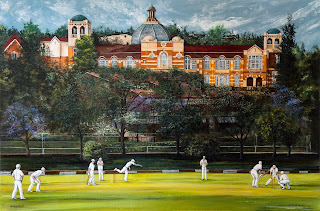Enough of the self-referencing. Almost
everything affects me. We tend to be like that. We tend to see everything as it
impinges on, appeals to, or at least relates to the ‘self’. Such is the world
since our birth. And for a while, like Schrodinger’s cat, we find ourselves
boxed in by our own beliefs. The family eventually grows. An extended family eventually
amplifies our sense of self. And all things, all people, all incidents, and all
experience, as I see it, utterly attain significance in relation to ourselves.
After all, a Boston Marathon is just that, until we directly know someone who
was in it. And then we feel more. Then we tell others. Then we are yet more
deeply affected. Even the shape of someone running by, as I type this, reminds
me of so and so, and so I am given to the relation, to the relationship, and to
the solipsism of my own import. (“We are, after all” as (Tuesdays with) Morrie
says, “in the human race!”)
Solipsisms are about me. Is that why we do not
easily take to the listing of inherent differences amongst us? We’ve heard of
Bloom’s Taxonomy; Maslow's Hierarchy; Kohlberg’s Moral Levels; of the Dabrowski
Theory of Disintegration (with its Five Stages); of Holland's Theory of Social Differences
(birds of a feather flock together); of Gregorc’s Mind Styles; of Dillinger’s
Psycho-Geometrics; and of the Johari Window. No? Well, what about Astrology? Well,
in each (never mind all the very many other theories out there) I am searching
for the identification of, an icon of, specifically, me! Where do I fit in? Not
necessarily in a narcissistic way, but in a solipsistic way. (The difference is
in that narcissism is about things that directly affect the self, whereas solipsism
is about identification with that which we personally have encountered.) So... Any
template suggesting that I am a number 3, for instance, as opposed to a 7, or a
1, will resonate more with my apperception of myself. (An enneagram!) Yet any
suggestion that I am ‘less’ than this, or not ‘that’, may well set me back on
my heels! I can feel marginalized. Hurt. Disbanded.
Predominance is a grounding concept. It suggests
that while I am a bit of everything (since we all are comprised of only six
essential elements: Oxygen, Hydrogen, Nitrogen, Carbon, Calcium, and Phosphates),
it is the predominance of the apportionment of chemistry, or of habit, or of
conceptualization, or of instinct that impels me. And as generic as I am, I
actually am the only living being exactly like me, specifically me, in the
whole world. As for me, so too for you! But then, this essay is all about me,
really. (Or do you find yourself in here too?)
We are instinctively put off when we are
pigeonholed. The bell curve can very much annoy with its containing the vast
majority of us within its bulge, despite the progress of all mankind, in
generality, through the centuries. You mean I'm normal, average, the same as
everybody else? Yet I see the bell curve not as a flat diagram on a page but
rather as a multidimensional ball of wool through which each of us, like
knitting needles, pokes in differing lengths. Yet what exactly is the object of
this ‘wooly’ advancement, this journey? Well, surely we all can agree that
there are concepts like depravity, decadence, violence, corruption and flatulence
at stake? (After all, where will you be at your “moment of poof”?) Who surrounds
you? What will the significance of your having passed through our world,
through our space-time continuum, through our warp and woof have proven, other
than that you got to do what you wanted to do, saw the world through your own
filters? (Yes, this all is indeed about you. Or do we now think it still is
about me?)
With yet another year soon to be turning over
(since we can but persist with the clunky calendar however Gregorian we may aspire
not to be) there will be a host of
celebrations and compulsions attending a variety of traditions. Each is to each
of significance. How can it be otherwise? (Well, raise a baby into an entirely
different culture, with different belief system, and even on a different
continent, and that is how it can be
otherwise!) Thing is, the point of all this is that you or me cannot help but
be who we are, relating to that which we do from the basis of our past, our
present, and our wishes for the future. How we care for others, ultimately,
makes all the difference. Thing is, as for me, so too for thee? Or is this now,
in-deed(s), still all about me?
http://www.bbc.com/future/story/20171115-millenials-are-the-most-narcissistic-generation-not-so-fast





























